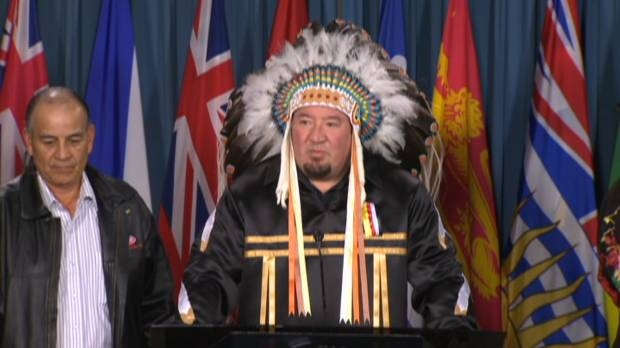BRANDON, Man. – Arriving on horseback — some wearing headdresses and carrying ceremonial staffs — members of a Manitoba First Nation appeared in court Tuesday to defend their right to operate an illegal smoke shop which sold cigarettes at half the price.

The Dakota Chundee smoke shop near Brandon opened in 2011 and has been raided several times by police.
It has since shut down, but the battle goes well beyond the sale of Mohawk tobacco from Quebec for $40 a carton.
Craig Blacksmith, with the Canupawakpa Dakota First Nation, has been charged with a raft of offences under Manitoba’s Tobacco Tax Act.
Blacksmith, who is representing himself in court, said he isn’t beholden to provincial law and will argue the First Nation doesn’t have official treaty status with Canada, so the government has no jurisdiction.
The province had no right to raid the smoke shop and seize its stock, he said.
“To them, they conducted raids,” he said in an interview outside court.
“But, until they prove jurisdiction, those are nothing more than armed robberies. Break and enter, kidnapping, extortion — that’s what the province is facing today.”
Canupawakpa First Nation is in a relatively rare situation in Manitoba.
The band had a treaty with the British, but current members don’t have official treaty status. They have been referred to as essentially refugees within Canada, a term Blacksmith said is offensive.
“We’re going in (to court) as a sovereign people,” he said. “There is no justification that the Crown’s sovereignty supersedes our sovereignty.”
The issue of illegal cigarettes has cropped up across Canada with several provinces moving to shut down the untaxed trade.
Rainbow Tobacco, a company that operates in a Mohawk community near Montreal, had its stock seized in aboriginal communities in British Columbia, Saskatchewan and Alberta.
The largest raid was on a reserve south of Edmonton where 16 million cigarettes were being stored for distribution and sale on reserves across Western Canada.
Three people are facing offences that carry a maximum fine of $20,000, six months in jail, or both.
The Federation of Saskatchewan Indian Nations has weighed in, saying the provincial government doesn’t have the authority to apply its tobacco tax laws on reserves and should butt out.
The Manitoba government has said the possession and sale of unmarked tobacco products is illegal under the Tobacco Tax Act.
The province has said the law applies to all tobacco sales, regardless of whether the cigarettes are sold on or off reserve, by aboriginal or non-aboriginal businesses.
But Grand Chief Derek Nepinak, with the Assembly of Manitoba Chiefs, said aboriginal people have been trading tobacco with each other for thousands of years.
“The recent arrival of provincial regulatory systems and laws to prevent indigenous trade in tobacco are completely unacceptable,” he said in an interview Tuesday.
“We have the Dakota people who are willing to stand on their economic sovereignty and assert their inherent rights to be able to participate in a free-trade economy with other indigenous communities.”
The federal government is underfunding First Nations and they have a right to support themselves, he added.
Nepinak said this is a dispute unlikely to be settled by a provincially appointed judge, who will probably just “apply the status quo.”
This is an issue that will have to be argued before the Supreme Court of Canada, he said.
“It’s going to be a long and protracted process,” he said. “This is just the start of it.”



Comments